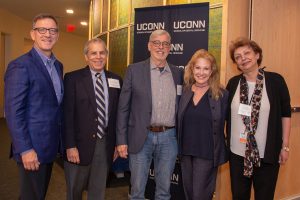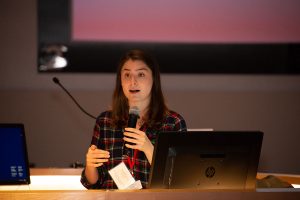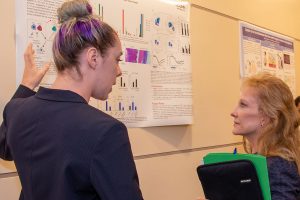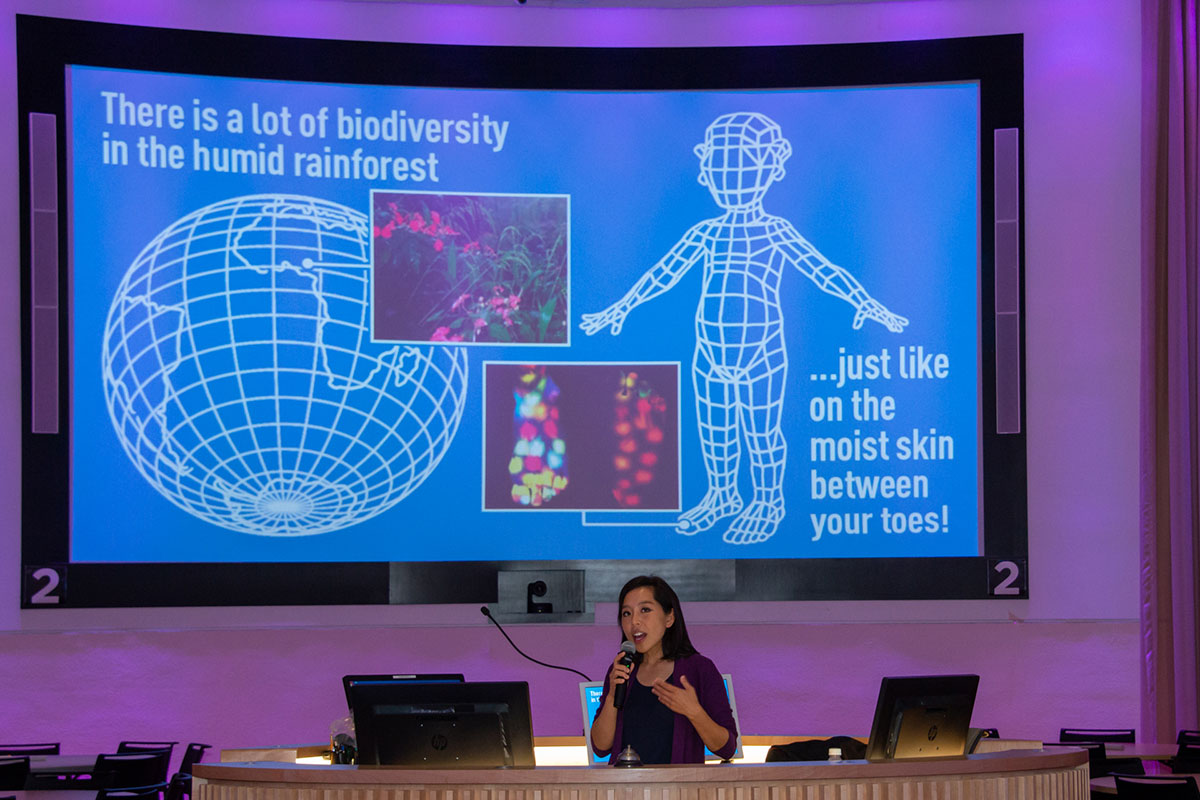Now in its fourth decade of funding from the National Institutes of Health (NIH), the Skeletal, Craniofacial and Oral Biology Training Program at the UConn School of Dental Medicine continues a rich tradition of producing researchers with a strong basic science background.
At the program’s annual symposium this week, 16 scientists-in-training shared their findings through oral or poster presentations. They include Ph.D. candidates, DMD/Ph.D. combined degree candidates, and postdoctoral fellows.

UConn’s is one of 13 dental schools in the United States with a research-focused training grant supported by the National Institute of Dental and Craniofacial Research (NIDCR), part of the NIH.
“Our program is unique in that we’re very strong in basic science,” says Jon Goldberg, professor of biomedical engineering, who co-directs the program with Dr. Mina Mina, chair of the Division of Pediatric Dentistry. “Part of our objective is to create a pipeline to develop future researchers.”
It’s a multidisciplinary program with mentors from beyond the dental school, including the UConn School of Medicine, the Graduate School, and The Jackson Laboratory for Genomic Medicine.
In her first symposium as dental dean, Dr. Sharon Gordon told the trainees they’re following in some very successful footsteps, noting that alumni hold positions of leadership across the country.
“The longstanding support of this program by the NIDCR speaks to the vision of integrating research and research training into the dental education program,” Gordon says.
Fifth-year DMD/Ph.D. candidate Michelle Spoto received the William B. Upholt Student Achievement Award in recognition of her scientific achievements and progress, and extracurricular involvement. Upholt, who died in 2016, was the training grant’s co-director for the first 25 years, before turning the program over to Mina. This is the first year of the award in his name.
“I’ve heard a lot of wonderful things about Dr. Upholt, both on the scientific side and on the side of public policy and political activism,” Spoto says. “It really is an honor to be recognized as a well-rounded individual rather than as someone who’s ‘just doing science’ day in and day out, but as a whole person too, which I think the award embodies.”

Spoto volunteers at the American School for the Deaf, giving public health lessons. Hours before she accepted her award, she delivered the symposium’s first oral presentation. It was a summary of the work she’s been doing at The Jackson Laboratory for Genomic Medicine (JAX) studying the human microbiome – the trillions of organisms that live in and on the human body.
“Everything she’s learning can be applied to the mouth, be it gums, dental decay,” Goldberg says. “She’ll have the research training to better understand what she’s seeing as a dentist. And her training at Jackson is world class.”
Spoto’s mentor is Julia Oh, assistant professor of genetics and genome sciences and microbiome researcher at JAX.
“Michelle is exceptionally qualified and well-rounded,” Oh says. “She has proved herself outstanding in many areas – academically, as an educator, as a mentor, and certainly as a scientist. I’m so pleased and proud that her achievements can be formally recognized.”
Oh was the symposium’s keynote speaker, also presenting on the human microbiome, likening its ecological complexity to that of a rain forest populated by “incredibly versatile” organisms.
The world of research training grants is a very competitive one, not only for the funding itself, but also for attracting the brightest scientific minds. UConn’s grant (NIDCR T90 DE021989) is up for renewal in 2021. Leadership will use feedback from an oversight advisory committee to identify opportunities to further strengthen the program.
The advisory committee, which attended the symposium, includes Dr. Mark Herzberg, director of the University of Minnesota Craniofacial Research Program, and Dr. Paul Krebsbach, dean of the UCLA School of Dentistry.
Kresbsbach is a graduate of the program he’s now evaluating. He was at UConn Health in the mid 80s for both a Ph.D. and a residency in periodontology. Before that he graduated from the University of Minnesota School of Dentistry, where he was one of Herzberg’s students. Both have directed similar programs at other institutions.
“We had an incredible cohort of young clinician-scientists-in-training who challenged each other and had fun together,” Krebsbach recalls of his time at UConn. “I think that UConn has maintained a strong research and research training tradition. UConn is one of the unfortunately somewhat small number of really research-oriented schools of dentistry that maintain the necessary tradition of understanding that ours is a learned profession based on a foundation of science.”
A more recent graduate of the Skeletal, Craniofacial and Oral Biology Training Program is Dr. Jessica Costa, who now is on the UConn Health faculty as an assistant research professor in the Center for Molecular Oncology.
“Really what makes this program so competitive in attracting both grants and trainees is the environment that fosters the complete education of dental students,” says Costa, who completed the combined DMD/Ph.D. program in 2009. “I think it’s really important for basic science researchers to be informed in their questions by real clinical problems. It’s important to get the big picture.”

One example of how the program has adapted to scientific advances is in the area of bone biology. Goldberg says this area of study has evolved to include tissue regeneration and tissue engineering. There’s also a greater focus on mathematical modeling.
“Part of our job is to say, ‘What skills are these kids going to need 20 years from now,’” Goldberg says.
For Spoto, who’s more than halfway through the program, 20 years from now ideally would be well into her tenure on the faculty of a large dental school.
“Being part of this program, we can be prepared to independently research questions in dental medicine and oral biology and craniofacial biology, and even though our projects aren’t necessarily dental related, it gives us the skill set to have those careers in the future,” she says.
Spoto is one of only six DMD/Ph.D. candidates at UConn. Another is Emma Wentworth, who’s in her second year in the program.
“It’s a very exclusive program, it’s very hard to get into, their expectations for us are very high, and I think that’s a very reasonable thing because it helps prepare us for what is ahead,” Wentworth says. “It makes us all very close, and we’re definitely willing to exchange advice with other people, and they’re always willing to take the time to personalize either your program or take the time to talk to you about who they think would be the best mentor for you.”
Her presentation at the symposium was on her study of bacteria in the mouth and their potential impact on oral mucositis, a painful condition common in cancer patients in which mouth sores can increase infection risk and hinder the ability to eat.
“This research training program is a jewel in the crown of UConn; not just in the School of Dental Medicine or UConn Health, but across the university,” Gordon says.



